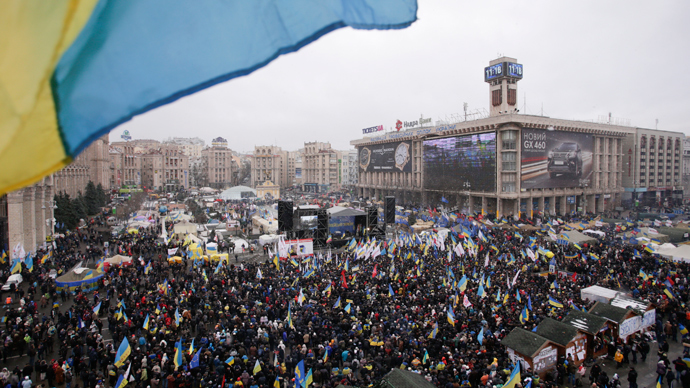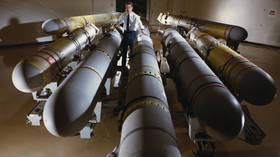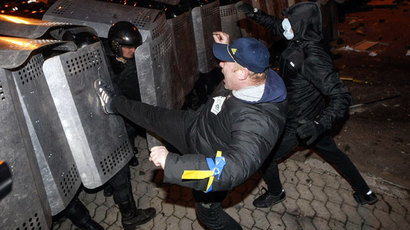Huge crowds rally for EU deal, build barricades in Ukrainian capital
Ukrainian protesters blocked streets leading to government buildings with barricades, as tens of thousands rallied on Kiev’s Independence Square. The opposition hoped its pro-EU protest would attract 1 million people, calling it “The Million March.”
Follow RT's LIVE UPDATES on protests in Kiev.
Nearly 100,000 protesters have gathered on Kiev’s center, according to police estimates. The opposition has claimed nearly 1 million people are taking part in the rally.
However, observers at the scene quoted by RT's Paul Scott said such a figure is way too “optimistic.” Ukrainian Interior Ministry later said in a statement that Independence Square can only hold up to 100,000 people dressed in winter clothes, citing own calculations.
Defying government instructions to stop blocking administrative buildings, opposition leaders on Sunday called on a several-thousand-strong group of demonstrators to move from Maidan toward government offices and “set up camp there.”

A large group of protesters then approached a thick police cordon surrounding the parliament (Verkhovna Rada) and the Cabinet of Ministers. Activists blocked the street next to the Ukrainian Cabinet of Ministers with makeshift barricades made from metal shields and concrete flower-beds.
The opposition Udar (Strike) party’s leader, Vitaly Klitschko, who headed toward the government buildings with the demonstrators, says that they aim to block the whole government quarter of offices, while Batkivschina (Fatherland) leader Arseny Yatsenyuk says the protesters will be picketing outside the buildings of “ministries, tax administration and other institutions.” Opposition leaders are expecting the protests to continue “until the resignation of the government.”
Meanwhile, a group of protesters has taken down the monument to Russian revolutionary leader Vladimir Lenin on Kiev’s Bessarabskya Square, decapitating and smashing the statue with hammers after it fell to the ground.
Ukrainian Interior Ministry reminded that the actions of peaceful protesters “should not infringe rights of other citizens” and warned that blocking traffic is punishable in accordance with the country’s criminal code.
The Security Service of Ukraine (SBU) also said in a statement it launched a criminal case into “actions directed at a government takeover” in the country. “Certain politicians” are suspected of undertaking unlawful actions with the ultimate aim of organizing a coup, the SBU said, adding that no charges have yet been filed in the case.
Opposition leader Oleg Tyagnibok of Svoboda (Freedom) party has condemned the opening of a criminal investigation as a “provocation” and an attempt to “terrorize” the people.

The demonstrators are protesting the Ukrainian leadership’s decision to withdraw from the EU association agreement last month. Opposition leaders demand that the current government steps down and are calling for immediate elections.
Ukraine’s former Prime Minister Yulia Tymoshenko, currently serving a seven-year prison sentence for abuse of office, has called on the pro-EU rally participants not to negotiate with the government.
“Don’t give up, don’t take a single step back, don’t have negotiations with the authorities,” Tymoshenko said in a statement, which was read out to the rally participants by her daughter Yevgenia. “Our goal is Yanukoych’s immediate removal from his presidential office.”
Several thousand supporters of the ruling Party of Regions have meanwhile gathered for a pro-government rally in Kiev’s Mariinsky Park, near the parliament (Verkhovna Rada). The organizers of the demonstration, called under the slogan, “Let’s create Europe in Ukraine,” claim it has attracted 15,000 participants.

The pro-government rally organizers are calling for the peaceful resolution of the political crisis, and they condemn the opposition for what they see as an attempt to destabilize the situation in the country and to split Ukrainian society.
On Friday, Ukrainian President Viktor Yanukovich paid a short official visit to Russia for brief talks in Sochi with Russia’s leader, Vladimir Putin. The two presidents discussed "trade and economic cooperation... and preparation for the future treaty on strategic partnership," according to the Ukrainian president’s office.
Later, Russian and Ukrainian officials said that the presidents didn't speak about Kiev joining the Moscow-led Customs Union. Earlier, media had reported the contrary.
On Saturday, a delegation of members of the European Parliament arrived in Ukraine to meet with opposition leaders and address the crowd in the streets of Kiev, spurring on the protest.
Russia accused Western nations of aggressively interfering in the internal affairs of a sovereign nation by supporting the protests.
“Excuse me, but taking part in such actions is called simply interference in internal affairs,” Russian PM Dmitry Medvedev said about the visit this week by German FM Guido Westerwelle to protests in Kiev.
“I wonder how our German partners would feel if, for instance, the Russian Foreign Minister just went to some gathering that was violating German regulations. I doubt they would take it as a friendly step,” Medvedev said.
The participation of EU politicians in Ukrainian rallies is a gesture of despair, argues Moscow-based political analyst Dmitry Babich.
“Since 2008, when the program of eastern partnership was launched, the EU has spent 2.5 billion euro on it,” Babich told RT. “And what was the result? This money, instead of being spent on the unemployed in Spain, the poor people in Greece, it was spent on telling Ukrainians how nice the EU is and how bad Russia is. This is why now the EU is desperately trying to make a semblance of activity.”
A week ago, several hundred thousand people took to the streets, angered over the violent police crackdown on anti-government protesters who occupied Kiev’s Independence Square the day before.














